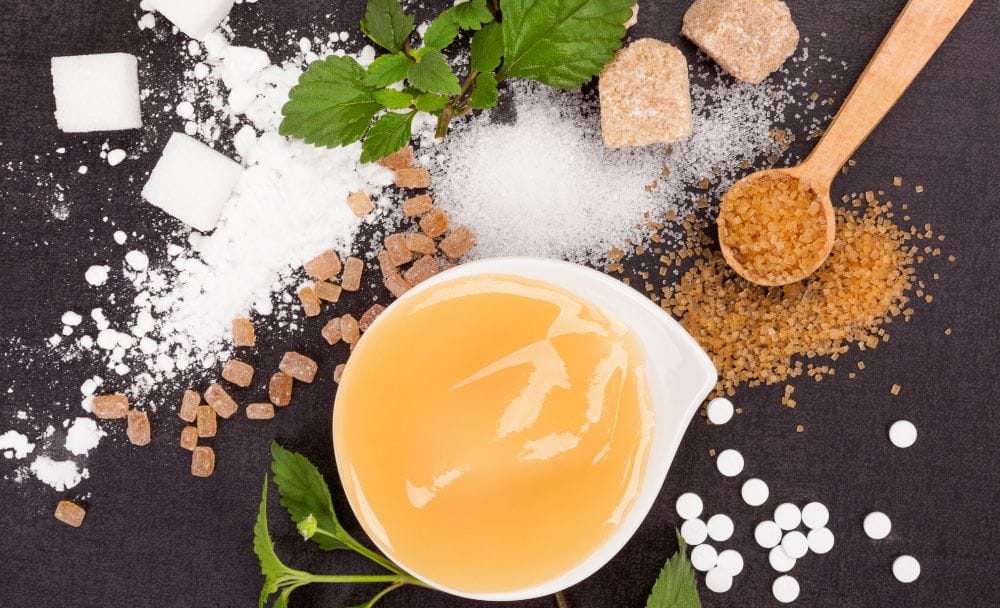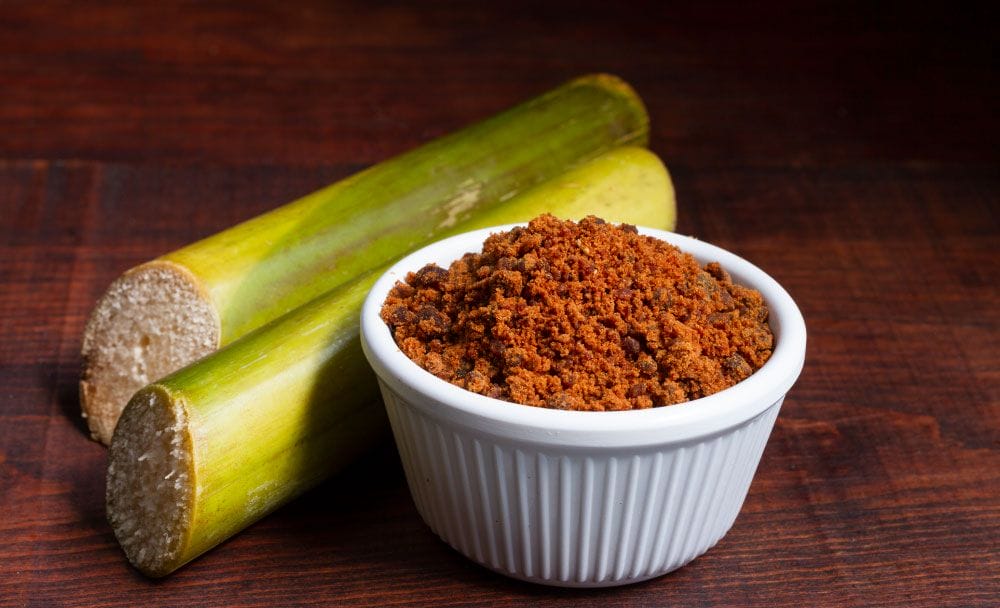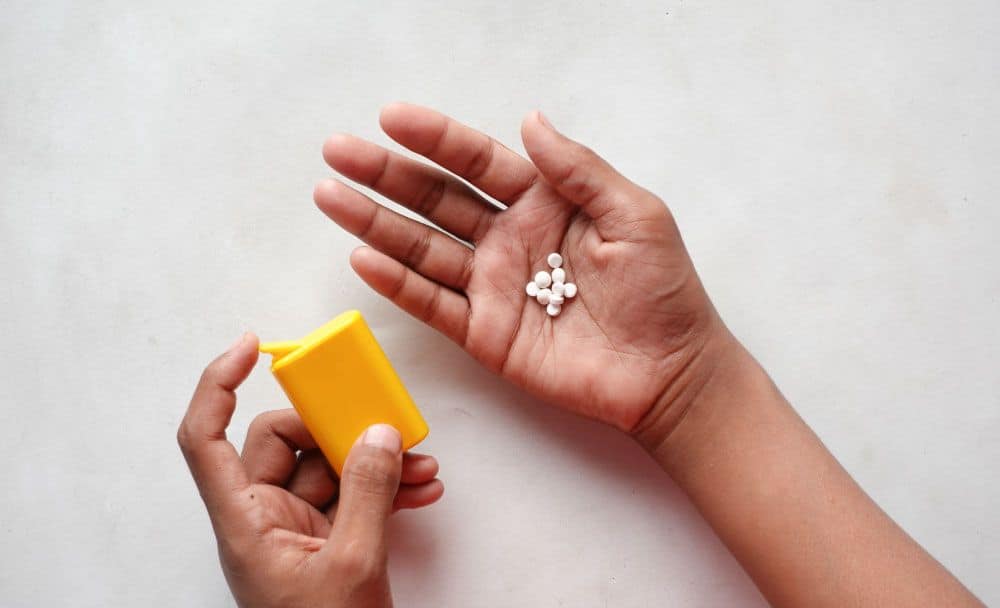
In recent times the craze and consciousness towards figure, fitness, and health have increased. People are becoming increasingly aware of the sweet curse that sugar brings with it. From peanut butter to chocolate syrups, added sugar can be traced in even the most unusual products. Researchers worldwide are trying hard to inform people about sugar’s various and obvious damaging effects. According to studies, too much sugar consumption can heighten the risk of Type 2 Diabetes, Obesity, [1] High Blood Pressure, Fatty Liver Disease, Inflammation, and Cardiac Problems. Therefore, the health-conscious population of our country is switching from sugar consumption to sugar substitutes. Consumers are demanding the best sugar substitute as they are eager to make healthier food choices.
What does Ayurveda say about sugary foods & sugar substitutes?
Ayurveda attaches importance to the sweet taste and considers sweet foods or condiments to be an energizer for the mind and body. But, by ‘sweet,’ Ayurveda means ‘foods’ and ingredients that are naturally sweet, such as sweet potatoes, honey, jaggery, rice, ghee, fruits, etc. A typical Sattvik diet includes lots of naturally sweet eatables. Refined white sugar is a strict No-No according to Ayurveda. It is considered tamasik in nature and can aggravate dosha imbalances in the human body.
What are sugar substitutes, the types & benefits?
Sugar substitutes may be defined as food additives or condiments that resemble sugar in taste and sweetness and are low in calories. [2] Sugar substitutes are of two types: Natural and Artificial/Synthetic. The various benefits of replacing sugar with sugar substitutes are as follows:
Enhanced & long-lasting flavor
Some sweeteners, such as Aspartame, can make foods more flavorful, and the sweetness and flavor of foods sweetened with Aspartame last longer than sugar-sweetened foods. [3]
Gives you an opportunity to ditch processed foods
When you take sugar substitutes instead of refined sugar, you are actually cutting down on your consumption of processed food items. That makes your choice a healthy one. [3]
Less Expensive
Certain sugar substitutes are much cheaper compared to refined sugar.[3]
Therapeutic benefits of sugar substitutes include weight management, diabetes control, reduced risk of cardiovascular diseases, and improved oral health. [3]
12 incredible sugar substitutes for good health
1. Honey (Madhu)
Raw honey is an excellent Ayurvedic sugar substitute. It is a thick liquid secreted by bees. It contains fructose and is about 25% higher in sweetness than refined table sugar [4] . It is rich in antioxidants like honey polyphenols that treat inflammation. [5] Also, honey has a low glycemic index [6], which makes it one of the best sugar substitutes for diabetics. Adding honey to your tea makes it ten times healthier. Therefore, honey is also a good sugar substitute for tea.
2. Jaggery (Gud)

Date palm jaggery, traditionally called ‘Gur,’ is a healthy sugar substitute. It is made out of Date Palm tree sap. Jaggery powder can replace sugar in tea, and that makes it a healthy sugar substitute for tea.
3. Maple Syrup
Maple syrup is a commonly used natural sweetener [7] made by cooking the sap of a Maple tree. It contains minerals like potassium, manganese, calcium, zinc, and iron. Coumarins and lignans in Maple syrup can have anti-inflammatory action.
4. Cinnamon (Daruchini/Tvak)
Cinnamon, a healthy sugar substitute, can be used to sweeten your teas, cakes, and muffins. It contains a compound cinnamaldehyde that helps cinnamon fight a wide range of health issues. Cinnamon powder can be used as a nutrient-rich sugar substitute for tea. This sweet Ayurvedic spice can also manage Type 2 Diabetes [8]
5. Stevia (Madhupatra)
Extracts obtained from the Stevia rebaudiana plant can be used as a safe, natural sweetening agent. [9] This sweetener is one of the ideal sugar substitutes for diabetics who are suffering from Type 2 Diabetes. [10]
6. Date (Khajoor)
Dry fruit dates are naturally sweet and can be a sugar substitute for sweetening your favorite dishes. Dates may be chopped and used as paste, syrup, and date powder. Dates contain phenolic compounds and many essential minerals. Therefore, dates are a healthy sugar substitute. [11]
7. Coconut Palm Sugar
Coconut Palm sugar is made out of the Coconut palm sap. It is a healthier sugar replacement as it is rich in essential minerals. [12] It resembles brown sugar in appearance and therefore is considered by many as a brown sugar substitute.
8. Monk Fruit
Monk fruit as a natural sweetener has become quite popular these days. The fruit extracts contain a substance mogroside which is extremely sweet. Monk fruit sugar is a Zero-calorie sugar substitute and can help you manage your weight aptly. Monk fruit sugar is one of the best sugar substitutes for diabetics and comes with several other health benefits, such as fighting inflammation, obesity, constipation, and infections. [13]
9. Sugar Alcohol
Sugar alcohols (Polyols) like Erythritol, Xylitol can be used as a sugar substitute and are naturally found in many fruits. Such alcohols have been a part of our diet for several years and are used as a bulk sweetening agent in low calorie foods. [14]
10. Aspartame

A dipeptide, Aspartame can be used as a low-calorie artificial sweetener. It is made up of components such as aspartic acids, amino acids, phenylalanine, and traces of ethanol. This sweetener has analgesic, anti-inflammatory, and anti-pyretic effects. [3]
11. Saccharin
Saccharin is a non-caloric sweetener that has been in use in the food and beverage industry for over a hundred years. During scientific research with toluene derivatives, this artificial sweetener was discovered. It is nearly 300-500 times sweeter than refined white sugar and is widely used in dietary foods and beverages and toothpaste. [3]
12. Sucralose
Sucralose is a non-caloric sweetener made from sucrose and is considered the latest international Zero-Calorie sugar replacer. It is a chlorinated sugar made by replacing three hydroyl groups with three chlorine atoms in sucrose. This sugar substitute is nearly 600 times sweeter than normal table sugar. [3]
FAQs
1. Which sugar substitute tastes similar to sugar?
Allulose, a natural sugar substitute, tastes almost like sugar and is without any aftertaste.
2. Which is the best sugar alternative in Ayurveda?
Ayurveda uses Rock Sugar, also called ‘Sita. This Rock Sugar is used in the famous Ayurvedic formulation, Chyawanprash. If you wish to buy Chyawanprash for anti-aging, immunity, cough & cold, and allergies, you can opt for the rich and delicious Zandu Sona Chandii Chyawanplus for the best results.
3. How can Stevia be consumed?
The herb Stevia or Madhupatra can be consumed as fresh leaves or as powdered Stevia by adding it to drinks and desserts. If you wish to buy high-quality Stevia for consumption, look nowhere else other than the house of Zanducare. Products like Stevia (Meethi Tulsi)- Tablets (8g -100N) and Stevia Powder (Meethi Tulsi) Natural Sweetener (100g) are simply great as natural sweeteners.
Conclusion
Consuming sugar in high quantities daily can damage your body to an irreparable extent. After all, nobody wishes to suffer the harmful impacts of diabetes, cardiac problems, and obesity. Sugar can also develop various dental problems and is the main culprit behind many long-standing health issues. This article introduces you to some very healthy sugar substitutes that can be used to replace harmful regular sugar while sweetening your fond desserts and dishes.
Disclaimer: All information provided in this article is for your knowledge and is not medical advice. If you wish to use any of the sugar substitutes mentioned here, you must consult a doctor first.
References:
- Perspective: A Historical and Scientific Perspective of Sugar and Its Relation with Obesity and Diabetes1,2,3,4
- Sugar Substitutes and Health: A Review
- Sugar substitutes: Health controversy over perceived benefits
- Honey and Health: A Review of Recent Clinical Research
- Honey and its nutritional and anti-inflammatory value
- Honey as a Potential Natural Antioxidant Medicine: An Insight into Its Molecular Mechanisms of Action
- Sugar and Sugar Substitutes: Recent Developments and Future Prospects
- The Effect of Cinnamon on Glucose of Type II Diabetes Patients
- Stevia as a Natural Sweetener: A Review
- STEVIA AS A NATURAL SWEETENER
- Dates as a substitute for added sugar in traditional foods – A case study with idli
- Coconut (Cocos nucifera L.) sap as a potential source of sugar: Antioxidant and nutritional properties
- Chemical Comparison of Monk Fruit Products Processed by Different Drying Methods Using High-Performance Thin-Layer Chromatography Combined With Chemometric Analysis
- Sugar alcohols: Chemical structures, manufacturing, properties and applications
Manage Diabetes With The Knowledge Of Ayurveda (Download Ebook)



















